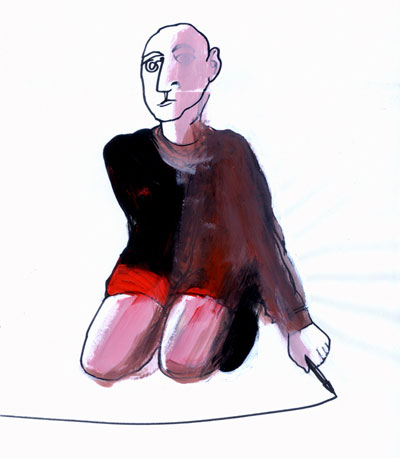 Every Saturday, we’ll be posting a new illustration by David Lester. The Mecca Normal guitarist is visually documenting people, places and events from his band’s 27-year run, with text by vocalist Jean Smith.
Every Saturday, we’ll be posting a new illustration by David Lester. The Mecca Normal guitarist is visually documenting people, places and events from his band’s 27-year run, with text by vocalist Jean Smith.
“I have an urge to paraphrase something from the bible,” says Frank. He raises both hands and turns into a TV evangelist. “There’s this guy, a prophet, who lives amongst the people, and he is known as the son of god, mainly because he says a lot of crackerjack, bang-on stuff that makes sense to people as they set about deploying their armies and coveting their neighbors’ barn yard animals.”
“Does this guy have a name?” Carol asks.
“We’ll call him Hank, because he has a hankering to get things working better than they were, and things weren’t working very well at all. Around the same time another prophet guy came up with the Golden Rule: Do unto others as you would have others do unto you. This was screwing things up quite a bit within the populace, because everyone had different desires and people were displaying animalistic urges. It turned ugly when, for instance, a guy wanted his neighbor’s wife to hop the fence and throw him up against the stable door and pull his pants down, because, in theory, if a guy wanted his neighbor’s wife to treat him that way, he was then obliged by the newly imposed Golden Rule to treat her thusly. So he’d hop over the fence and throw his neighbor’s wife up against the stable door, etc.
“Additionally, the vast majority of people felt they weren’t worthy of being treated well at all and so, learning that they were supposed to treat others that same way, it resulted in more than a few punched noses and bruised-up shins. It was worse than chaos—that formless, void state preceding the creation of the universe.
“The Golden Rule had backfired, but it was like closing the stable gate after the donkeys had already sauntered off in those straw hats with the holes cut out for their ears, which were very much in vogue that season.
“Another contributing factor to the general negativity was that people were pretty down on themselves because the whole money thing, as a system to regulate the exchange of labor for goods, wasn’t working out. They were having problems with people who wanted to take money without doing the required labor to get it and that resulted in people having to protect their money and their property—the stuff they’d used the money for—and in their sense of entitlement to defend their stuff, property became an extension of the self, as if it had the same value as a human life.
“Hank could usually be found sticking his oar into someone else’s business, but his smooth tongue and handy pocket-sized book of parables kept him out of hot water. He’d toss in a few extraneous words to buy himself time, while, in his mind, he constructed words of wisdom, words worthy of god, because he had a reputation to keep up. Because he was known for his hankering to help, people took what he said at face value and without proverbial grains of salt. That is to say, when he talked, people listened.”
“And what did he have to say?”
“He said that if a man asks for water, don’t give him wine.”






